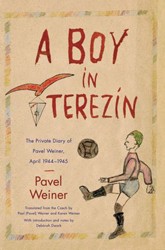In his first book, The Inextinguishable Symphony, Martin Goldsmith recounted the history of the Kulturbund — a virtual ghetto for Jewish cultural life in Nazi Germany — through the experiences of his own parents. Gunther and Rosemarie Goldschmidt, both musicians in the Kulturbund, managed to escape to America. The author’s grandfather and uncle were not so lucky.
Martin’s grandfather, Alex Goldschmidt, had a knack for business, an eye for style, and a reputation for honesty as the proprietor of fashionable clothing shops in Oldenburg, in Lower Saxony. His handsome home near the center of town crowned his success, which was destined to be cut short. Deprived of his livelihood by the Nazis, he and his son Klaus Helmut followed a trail of tears that ended in Auschwitz in 1942.
In 1939 there was a ray of hope: the father and son were among the 937 passengers on the “voyage of the damned,” the passage of the MS St. Louis from Hamburg to Havana. But Cuba refused to take in the refugees, as did the U.S., and the ship returned to Europe. For the next three dismal years Alex and Klaus were forced from camp to camp in France, until they were transported to the Velodrome d’Hiver in Paris and then to their deaths.
Reliving their experiences as he undergoes his own, Alex’s grandson retraces their steps in Germany and France, bringing the past movingly into the present with well-chosen details and great emotional honesty. Martin Goldsmith has done more than shape a gripping and moving story: He has rescued these two victims of the Nazis from oblivion. In the words of the prophet Isaiah: V’natati lahem yad vashem – “I shall give them a memorial and a name, a name that shall endure forever.”
Related content:
Bob Goldfarb is President Emeritus of Jewish Creativity International.





